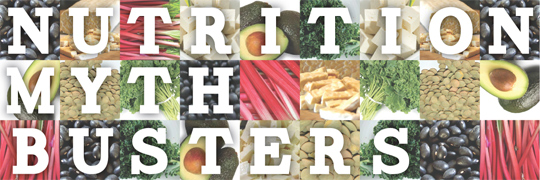Nutrition 101
Nutrition Myth-busters: Vegetarian Diets

Caitlin Heffley, fourth year Clinical Nutrition student at UC Davis and writer of the Healthy Aggies blog, dispels two common myths concerning the health implications of a vegetarian diet.
Myth:
“It is impossible to get enough protein on a vegetarian diet”
Facts:
-
Not only is it possible to get enough protein from plant sources, but also there are other nutritional benefits, including a greater intake of fiber, potassium, immune system-boosting phytonutrients and a lower intake of saturated fat and cholesterol.
-
There are some plant-based proteins that are not as easily digested as animal proteins. Animal proteins are also denser with protein when compared to many plant-based proteins. Therefore, vegetarians should incorporate more plant-based proteins into their diet than meat-eaters. The RDA is .36 grams of protein per pound of body weight daily. Vegetarians should aim for .41 grams per pound.
-
Healthy plant-based sources of protein include legumes, soy products, whole grains, and nuts. Legumes, such as black beans and lentils, are excellent sources of fiber, vitamins and minerals and are low in fat.
-
Soy products, such as tofu or tempeh, are some of the most versatile vegetarian protein sources. Tofu can be incorporated into soups or stir-frys, and tempeh can be marinated or grilled to be included in salad or sandwiches.
Myth:
"You must eat dairy products to build strong bones”
Facts:
-
The key nutrients for bone health are calcium, vitamin D, and protein. While these nutrients are present in dairy such as cow’s milk, they also exist in many plant-based foods.
-
Some studies show that the ratio of dietary calcium to protein is a better predictor of bone health than calcium intake alone. Vegetarians should try to consume a variety of nutrient-dense foods such kale (1 cup = 179 mg calcium), tofu (4 oz = 11 g protein, 200-300 mg calcium), and soymilk (1 cup = 7g protein, 200-300 mg calcium).
-
While spinach and rhubarb are good sources of calcium, they are also high in oxalates, which decrease calcium absorption in the body. Therefore it is advisable to favor other green vegetables more often.
-
Vegetarians may find it is easier to meet the 1000 mg daily requirement for calcium needs if calcium-fortified foods or dietary supplements are utilized.
-
Calcium absorption can be maximized by pairing calcium-rich foods with foods containing vitamin C.
Have you heard any other nutrition myths that you would like us to address? Let us know in the comments section below.
nutrition advice, nutrition facts, vegetarian, protein, myths, nutrition myths, myth-busting
Latest Posts

October 16, 2018 by Doreen Garelick, Dietetic Intern
Our intern Doreen attended a food waste summit for restaurants and compiled these tips to help food service operators redirect food waste from landfills.
Read more ›
Nutrition 101

Nutrition 101
September 26, 2018 by Doreen Garelick, Dietetic Intern
Ever notice headlines about rapid weightloss? Dietetic Intern Doreen Garelick looks deeper into a recent eye-catching headline to see if there's any truth behind it.
Read more ›
Connect
Blog Search
Categories
SPE Certified Newsletter
Sign up for news on the latest SPE-certified venues, events and SPE updates.
We will never share your personal information with a third party.




Connect
 Follow us on Twitter
Follow us on Twitter Friend us on Facebook
Friend us on Facebook Follow us on Pinterest
Follow us on Pinterest Follow us on Instagram
Follow us on Instagram Read our Blog
Read our Blog Watch videos on YouTube
Watch videos on YouTube Watch videos on Vimeo
Watch videos on Vimeo Connect with us on Linkedin
Connect with us on Linkedin Find us on Foursquare
Find us on Foursquare
Tweets by @SPEcertifiedBlog Search
Categories
SPE Certified Newsletter
Sign up for news on the latest SPE-certified venues, events and SPE updates.
We will never share your personal information with a third party.